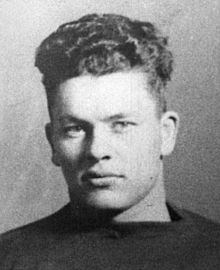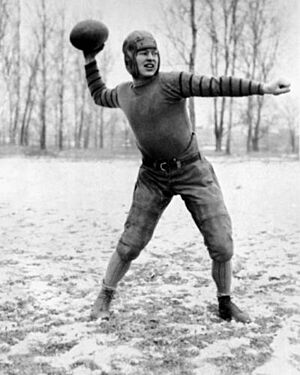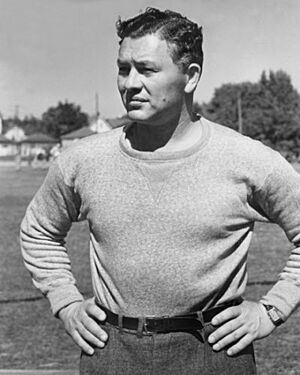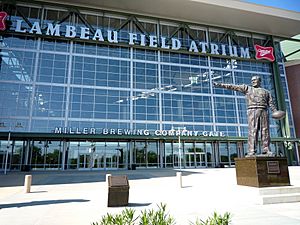Curly Lambeau facts for kids

Lambeau at Notre Dame, 1918
|
|
| No. 1 | |
|---|---|
| Position: | Back |
| Personal information | |
| Born: | April 9, 1898 Green Bay, Wisconsin |
| Died: | June 1, 1965 (aged 67) Sturgeon Bay, Wisconsin |
| Career information | |
| High school: |
|
| College: | Notre Dame |
| Career history | |
| As player: | |
|
|
| As coach: | |
|
|
| Career highlights and awards | |
|
|
| Head coaching record | |
| Regular season: | 226–132–22 (.624) |
| Postseason: | 3–2 (.600) |
| Career: | 229–134–22 (.623) |
| Player stats at PFR | |
| Coaching stats at PFR | |
|
Pro Football Hall of Fame
|
|
Earl Louis "Curly" Lambeau (born April 9, 1898 – died June 1, 1965) was a famous American football player and coach. He played and coached in the National Football League (NFL). Curly Lambeau, along with his friend George Whitney Calhoun, started the Green Bay Packers team in 1919.
From 1919 to 1929, Lambeau was both a player and the coach. He was in charge of the team's daily activities. As a player, Lambeau was a halfback, which was a very important position back then. He was the team's main runner and passer. He scored 35 touchdowns (8 running, 3 catching, and 24 passing) in 77 games. He won his only NFL championship as a player in 1929.
Lambeau was the head coach and general manager of the Packers from 1919 to 1949. He led his team to over 200 wins and six NFL championships. This included winning three championships in a row from 1929 to 1931. He is one of only a few coaches to win so many NFL championships, like George Halas and Bill Belichick. Lambeau also coached eight players who later became members of the Pro Football Hall of Fame. His teams, with players like quarterback Arnie Herber and receiver Don Hutson, changed how teams used passing in football.
After some disagreements with the Packers Board of Directors, Lambeau left the Packers. He then coached the Chicago Cardinals and Washington Redskins for two seasons each. He retired from coaching in 1953.
Curly Lambeau has received many honors for his achievements. He was named to the National Football League 1920s All-Decade Team as one of the best halfbacks of the NFL's first ten years. He was one of the first people chosen for the Pro Football Hall of Fame in 1963. He was also in the first group inducted into the Green Bay Packers Hall of Fame in 1970. This was to honor his role as the founder, player, and coach of the Packers. After he passed away in 1965, the Packers' home stadium was renamed Lambeau Field in his honor. This stadium is still used today.
Contents
Early Life and College
Curly Lambeau was born on April 9, 1898, in Green Bay, Wisconsin. His parents, Marcelin Lambeau and Mary LaTour, were of Belgian background. Lambeau went to Green Bay East High School. He was known as a great athlete there. He played football all four years and became captain in 1917.
A sportswriter named George Whitney Calhoun said in 1917 that Lambeau was one of the best high school football players ever. Lambeau did not go to the University of Wisconsin. After high school, he worked with his father in construction. He also played for local football teams.
In 1918, Lambeau went to the University of Notre Dame. He played for the famous college coach Knute Rockne. He made the Notre Dame Fighting Irish football team. But he got very sick with tonsillitis and had to miss school in 1919. He never went back to Notre Dame. After getting better, Lambeau worked as a shipping clerk for the Indian Packing Company.
Starting the Green Bay Packers
Curly Lambeau and George Whitney Calhoun started the Green Bay Packers on August 11, 1919. The Indian Packing Company gave them $500 for uniforms. That fall, they got Willard Ryan, a former high school coach, to coach the team.
The team's name, "Packers," was suggested by Curly's girlfriend, Agnes Aylward. Curly wanted to call them "The Green Bay Indians" because of the Indian Packing Company. But Agnes said, "Well, for heaven's sake, Curly, why don't you just call them the Green Bay Packers!" The team's naming rights were later sold to the Acme Packing Company, but the name "Packers" stayed.
At first, the Packers played against teams from Wisconsin and Michigan. Because the team did well in 1919 and 1920, they joined the American Professional Football Association in 1921. This league later became the National Football League (NFL).
Playing Career
Lambeau was a player-captain when the team started. He played for the Packers for ten seasons. This included the first eight seasons after the team joined the NFL in 1921. He played as a halfback in the single wing offense. This meant he was both the main runner and passer.
Lambeau threw 24 touchdown passes, ran for 8 touchdowns, and caught 3 touchdowns in 77 games. He was the first Packer to throw a pass, throw a touchdown pass, and make a field goal. He also sometimes kicked for the team, making 6 field goals and 20 extra points. He won his only NFL championship as a player-coach in 1929. After that, he focused only on coaching.
Coaching the Packers
After just one season, coach Willard Ryan left the Packers. Curly Lambeau then became the player-coach. Even in the first season, Lambeau, as team captain, did many things a head coach does today. In early pro football, coaches couldn't talk to players during games. So, Lambeau was the team's leader on the field. He called plays, signed players, and ran practices. Because of this, the Packers see Lambeau as their first head coach.
In 1921, he led the team into the American Professional Football Association, which became the NFL in 1922. After he stopped playing in 1929, he stayed as head coach and general manager until 1949. For most of this time, he had almost complete control over the team's daily work. He also represented the Packers at meetings with other team owners.
Before joining the NFL, the Packers had a great record of 19 wins, 2 losses, and 1 tie in 1919 and 1920. Under Lambeau in the NFL, the Packers won six championships. These were in 1929, 1930, 1931, 1936, 1939, and 1944. He is still the coach with the most wins in Packers history.
The Packers were most successful in the 1930s. This was thanks to players like quarterback Arnie Herber and receiver Don Hutson. Herber and Hutson helped create the modern passing game. This allowed the Packers to be very strong throughout the 1930s.
In 1946, Lambeau bought Rockwood Lodge. This was a training facility for the team. It was the first of its kind in professional football. The purchase was a bit controversial. Some team leaders were worried about the cost. Players also disliked the facility because the fields were very hard. Sometimes, Lambeau had to move practices to other fields.
The team's performance started to decline after Don Hutson retired in 1945. In 1948, the Packers had their first losing season since 1933. In 1949, they only won two games, which was their worst season ever. This was partly because Lambeau kept using an old offensive style called the Notre Dame Box. Most other teams had moved on to newer strategies.
The Packers also faced money problems because of the Rockwood Lodge purchase. By the end of 1949, the team was close to going bankrupt. Lambeau tried to find investors to help the team. But his ideas led to disagreements with the team's leaders. He officially resigned on February 1, 1950. Seven days later, Rockwood Lodge burned down. The insurance money from the fire helped the Packers solve their money problems. This made sure the team could stay in Green Bay.
Coaching Other Teams
After leaving the Packers, Lambeau became the head coach of the Chicago Cardinals. He was also named vice president and had full control over choosing players. In 1950, the Cardinals finished with 5 wins and 7 losses. In 1951, they did even worse, with 3 wins and 9 losses. They did not make the playoffs in either season.
Lambeau then coached the Washington Redskins in 1952 and 1953. In August 1954, Lambeau had a big argument with the Redskins owner, George Preston Marshall. He was fired right after that.
Personal Life
Curly Lambeau was married three times. He had one son with his first wife, Marguerite Van Kessel.
While he was a player-coach for the Packers, Lambeau also coached his old high school team, Green Bay East High School, from 1919 to 1921. His record there was 14 wins, 4 losses, and 3 ties.
Lambeau passed away on June 1, 1965, at age 67. He had a sudden heart attack in Sturgeon Bay. He was helping his girlfriend's father cut grass when he collapsed.
Legacy and Impact
Without Curly Lambeau, there might not be professional football in Green Bay. With help from George Whitney Calhoun and others, Lambeau helped keep the NFL in Green Bay. He also saved the Packers from going bankrupt many times.
The biggest sign of his impact is the name of the Packers' home stadium, Lambeau Field. The stadium opened in 1957 as the second City Stadium. It was called "New" City Stadium for its first eight years. Just two months after Lambeau's death in 1965, the stadium was renamed Lambeau Field. This honored his work as the team's founder, player, and coach.
Lambeau Field is a very famous stadium. The Green Bay Packers and the community keep updating it instead of building a new one. This makes Lambeau Field the oldest continuously used NFL stadium. The name Lambeau is so strongly connected to the stadium that the Packers have not sold its naming rights. Instead, they sell naming rights to the different entrance gates. During a renovation in 2003, the Packers put up a 14-foot statue of Lambeau at the main entrance. A street in Green Bay is also named Lambeau Street in his honor.
As a player and coach, Lambeau is known for starting daily practices. He also helped make the forward pass popular in the NFL. He created pass patterns and had teams fly to away games. He was a second-team All-Pro player for three seasons (1922–1924). He was also named to the National Football League 1920s All-Decade Team.
As one of the last player-coaches, he led the Packers to over 200 wins. He won six NFL Championships and coached eight future Pro Football Hall of Fame players. He was the first coach to lead an NFL team to three championships in a row (1929–31). Only one other Packers coach, Vince Lombardi, has done this (1965–67).
For his contributions to football, Lambeau has been honored by many groups. In 1961, he was chosen for the Wisconsin Athletic Hall of Fame. He was part of the first group of people inducted into the Pro Football Hall of Fame in 1963. He was also in the first group chosen for the Green Bay Packers Hall of Fame in 1970.
Images for kids
See also
 In Spanish: Curly Lambeau para niños
In Spanish: Curly Lambeau para niños
 | Calvin Brent |
 | Walter T. Bailey |
 | Martha Cassell Thompson |
 | Alberta Jeannette Cassell |








